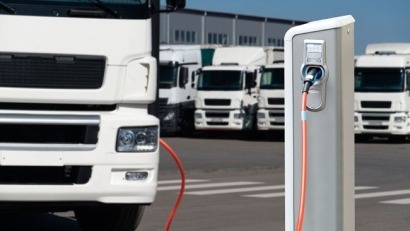
“Electric fleet commitments are increasing as companies with ambitious sustainability goals work to decarbonize business operations,” said Harry Sideris, executive vice president of customer experience, solutions and services for Duke Energy. “We are helping speed commercial fleet electrification across the Duke Energy footprint through innovations like this, while we electrify our own fleet.”
Modeling an electric future
The fleet electrification center at Duke Energy’s Mount Holly Microgrid Center will provide a commercial-grade charging experience for fleet customers evaluating or launching electrification strategies – reinforcing reliability, clean power and optimization by integrating with solar, storage and microgrid controls software applications.
By the end of 2023, fleet operators will be able to experience a best-in-class, commercial-grade fleet depot, integrated with energy storage, solar and optimization software, showcasing a model for reliable fleet electrification.
The center will be able to be connected either to the Duke Energy grid, charging from the bulk electric system, or powered by 100% carbon-free resources through the microgrid located at Mount Holly. The project is the first electric fleet depot to offer a microgrid charging option.
"Moving to zero-emission vehicles in this sector will allow North Carolina to seize the enormous economic potential this transition presents, generating billions in net benefits for our state. Projects like this are key for North Carolina fleet owners to take advantage of the cost savings in transitioning to electric vehicles,” said Will Scott, director of southeast climate and energy, Environmental Defense Fund.
On this effort, Duke Energy is teaming with Electrada, an electric fuel solutions company, as part of a larger fleet electrification collaboration. Electrada invests all required capital “behind the meter” on behalf of fleet owners and delivers reliable charging to fleet electric vehicles through a performance contract, eliminating the complexity and risk that fleets face in transitioning to this new source of fuel.
The Electrada model provides secure and seamless conversion for fleets that ensures grid integrity and removes electric fleet charging price volatility. Electrada’s investment on the depot side allows Duke Energy to focus on distribution system performance to support the predictable addition of electric load over time.
“Reducing long-term energy cost and performance risk creates a smoother transition for fleets, increases confidence in electrification, and enables the technology to become more mainstream,” said Kevin Kushman, CEO of Electrada.
Daimler Truck North America (DTNA), the largest heavy-duty truck manufacturer in North America and leading producer of battery-electric trucks, will join Duke Energy and Electrada as a founding participant in the fleet EV charging program at the Duke Energy Emerging Technology and Innovation Center.
One of DTNA’s largest East Coast manufacturing facilities is located directly adjacent to the center; this proximity creates an ideal opportunity to utilize the chargers at the site and also demonstrate charging technologies to customers visiting the plant in the future.
“This first-of-its-kind, microgrid-enabled fleet depot will be critical to advancing fleet electrification and building confidence with fleet owners. We look forward to collaborating with Duke Energy and Electrada on this important effort,” said Jeff Allen, senior vice president of operations and specialty vehicles at DTNA.
Carbon-neutral freight transportation driven by innovation
In addition to fleet charging, the site will also function as an innovation hub, allowing Duke Energy to study charger use, performance, management and energy integration.
Identifying EV charging technologies and how they may be used to power any type of fleet with vehicles ranging from class 1 (pickups) to class 8 (over-the-road haulers) will help develop a model that shows the industry a clear, integrated and cost-effective path to fleet electrification. Testing various models of charging scenarios will enable energy load shaping, which can be used to ensure proper grid or microgrid distribution.
The Duke Energy fleet depot will demonstrate that utilities, emerging fleet charging infrastructure solutions, and vehicles may be planned, deployed and operated in a reliable, efficient and interoperable manner, inclusive of the integration of distributed power resources, such as solar and stationary battery storage.

